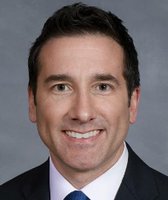Stand up for the facts!
Our only agenda is to publish the truth so you can be an informed participant in democracy.
We need your help.
I would like to contribute

Border Patrol agents talk with migrants seeking asylum as they prepare them for transportation to go through processing, June 5, 2024, near Dulzura, Calif. (AP)
If you listen to some politicians, North Carolina — located more than 1,000 miles away from Mexico — has become a border state because of the Biden administration’s immigration policies.
North Carolina’s airwaves are carrying political advertisements for Republican candidates, showing images of people jumping fences and walking across arid land. North Carolina Republicans in Congress have sounded the alarm about a federal facility in Greensboro intended to house minors who cross the southern border into the U.S. without authorization.
They’ve even called on the state’s Democratic governor, Roy Cooper, to send the state’s National Guard troops to Texas.
"Every day, North Carolinians are forced to suffer the consequences of President Biden’s open border policies," dozens of Republican lawmakers wrote to Cooper in January. "Under his administration’s watch, millions have illegally poured through our southern border and have wreaked havoc on our public safety, strained our social safety net, and weakened the rule of law in our country."
The rhetoric paints a picture of a state overwhelmed by noncitizens who have entered the U.S. illegally under President Joe Biden’s administration. But data — offering insight into North Carolina’s crime, public school system, and social safety net — paints a different picture.
Sign up for PolitiFact texts
The legislators’ letter to Cooper claims "increased criminal activity and overstressed resources are just a few of the challenges that North Carolina faces as a result of the federal government’s inaction" at the border.
Although noncitizens have committed high-profile crimes in North Carolina, there’s little evidence to suggest they’re driving a statewide spike.
That’s partly because the state’s crime is down overall and partly because North Carolina’s top law enforcement agencies don’t compile data about crimes committed by noncitizens. The State Bureau of Investigation doesn’t track crimes committed by noncitizens. Nor do the state Department of Public Safety or the state’s attorney general’s office.
The SBI is North Carolina’s primary crime tracker. Its latest available data for violent crime shows a downward trend. The bureau’s most recent data is from 2022. North Carolina SBI Data for 2023 won’t be published until later this year, a bureau spokeswoman said.
The rate of violent crime — defined as murder, rape, robbery and aggravated assault — was 412 per 100,000 people in 2022. That’s down from 428 per 100,000 in 2021 and 451 in 2020, the SBI reported.
Nationally, Federal Bureau of Investigation statistics show a more drastic downward trend. The FBI found 2022 violent crime rate was among the third-lowest reported in the past 50 years, and preliminary estimates for 2023 show the national violent crime rate continuing to fall.
Jeff Asher, a crime analyst for AH Datalytics, wrote in April that the federal crime data system isn’t set up to definitively answer the question of whether there is an immigrant-driven crime wave.
"That said," Asher said, "the overall trend of declining violent crime nationally, and seeing no localized crime surges in the places I’d expect to see one if there was such a ‘wave,’ strongly suggests that no such thing exists."
That doesn’t mean noncitizens don’t commit violent crimes.
Awet Hagos, a native of the African nation of Eritrea, was in a standoff with Gates County law enforcement earlier this year. And, in 2022, Mexican brothers Arturo Marin Sotelo and Alder Alfonso Sotelo were charged with murdering a Wake County Sheriff’s deputy.
Those cases, though, don’t directly implicate the Biden administration’s border policy.
Hagos entered the U.S. legally in 2016 and then failed to depart when required, according to the U.S. Immigration and Customs Enforcement. His departure date is private information, Lindsay Williams, an Immigration and Customs Enforcement spokesperson, said. The Sotelo brothers entered the U.S. unlawfully, but the agency doesn’t know where or when, Williams said.
Some politicians have claimed there’s a link between the U.S. border and drug overdoses across the nation, specifically from fentanyl. Republican U.S. Rep. Dan Bishop, who represents a Charlotte-area district, cited Biden immigration policies when mourning a Cornelius teen who died by overdose of fentanyl, a potent synthetic opioid.
"These deaths are preventable, but the Biden administration refuses to enforce our laws and secure the border," Bishop said in a July email to constituents.
Fentanyl-related deaths have skyrocketed in North Carolina — from 442 in 2016 to 3,340 last year — according to a report by the North Carolina Chief Medical Examiner.
The illicit drug primarily enters the U.S. from Mexico. But North Carolina-based noncitizens aren’t the primary transporters or distributors.
Illicit fentanyl is most often packaged by Mexican cartels, transported across the border by U.S. citizens, and then distributed by domestic gangs, according to government data and policy analysts.
About 86% of the people convicted of trafficking fentanyl between 2019 and 2023 were U.S. citizens, according to the U.S. Sentencing Commission. And most of the fentanyl trafficked into the U.S. is smuggled on vehicles that travel through legal ports of entry, according to the U.S. Department of Homeland Security and its Customs and Border Protection agency.
Vanda Felbab-Brown, a senior foreign policy fellow at the Brookings Institution think tank, said generally speaking "drugs like fentanyl are not carried by migrants."
Felbab-Brown co-directs her institute’s series, "The Opioid Crisis in America: Domestic and International Dimensions." She said installing more and better vehicle scanners at U.S. ports of entry would be the most effective way of stopping illicit fentanyl from entering the country. Only Congress can do that.
One of the most frequently cited examples of the need for immigration reform sits tucked in a neighborhood in northwest Greensboro. That’s where the federal government has been upfitting a former boarding school campus to serve as temporary housing for up to 800 teenagers who arrive at the southern U.S. border without a parent.
Republican officials — from U.S. Sen. Thom Tillis and U.S. Rep. Richard Hudson to Lt. Gov. Mark Robinson — have held press conferences demanding information about the center.
The federal government’s communication with local officials hasn’t been as good as it could be, Greensboro Mayor Nancy Vaughan told PolitiFact NC. She’s had to address scores of rumors about migrants at the facility — even though the center has yet to welcome any teens.
"There's just been a lot of angst, I would say, especially from people in the neighborhood," Vaughan told PolitiFact NC. "And I certainly understand that, because they don't know what to expect and because of, you know, rumors and false news stories."
The Greensboro mayor says she has worked hard to address legitimate concerns:
- To the question of whether the migrants stay in the area long-term, Vaughan said that’s not how the program is designed to work. The children will stay about three or four weeks until they’re transported to be with their parents, a relative or a sponsor.
- To concerns that migrants will be allowed to leave the campus or need to rely on local amenities, Vaughan said the campus is designed to be self-sufficient. It has its own dormitories, a medical facility, a dining hall, a track, soccer fields and tennis courts.
- In response to worries about traffic fueled by the facility’s nearly 800 employees, federal officials opened a remote parking lot and shuttling workers to the campus, Vaughn said.
- To concerns that the migrant center would require local taxpayer dollars. Vaughan has been assured that it will not.
"So far, I don't believe there have been inconveniences," she said, "except for the anxiety."
In the letter calling for Cooper to send the National Guard to Texas, House Republicans pointed to a situation in New Hanover County Schools as an example of immigration affecting North Carolina’s public education efforts.
"Even as you declared 2024 the ‘Year of the Public School,’" they wrote to Cooper, "the New Hanover County Schools Superintendent proposed closing a special-needs public school and replacing it with a ‘newcomers school’ for non-citizens."
That description of the New Hanover situation isn’t entirely accurate.
New Hanover leaders did consider closing the Career Readiness Academy at Mosely, which helps students prepare for high school. The academy serves students with special needs — as many public schools do — but isn’t considered a special-needs school by the state, said Blair Rhoades, a state Department of Public Instruction spokesperson.
At the same time, New Hanover leaders were considering consolidating academic services for multilingual students into one location, said Christina Beam, a New Hanover County Schools spokesperson.
"This idea never moved out of the exploratory phase and is not moving forward. We are also keeping the career readiness high school program open," Beam told PolitiFact NC.
The students’ citizenship status was never considered, Beam said. Neither New Hanover County nor the state track the citizenship status of their students.
Many school districts stopped tracking students’ immigration status after the U.S. Supreme Court prohibited Texas from excluding students who are in the country illegally, Rhoades said. That was in 1982.
"The Supreme Court case discussed the concern that it is unfair to punish students for the misconduct of their parents who may have crossed the border illegally," Rhoades said in an email.
"Further, the Court reasoned that the public interest weighs against having a class of children in the U.S. that are educated and out of school," Rhoades said. "As a result of this case, information about the immigration status of students is pretty universally not collected by public schools."
The state’s English learners population has grown modestly in recent years.
The number of English learners in North Carolina public schools rose from about 128,060 during the 2019-20 school year to 162,778 during the most recent school year, according to the Department of Public Instruction. Over that time, they became a slightly larger percentage of the total public school population. English learners accounted for 8.3% of the public school population in 2019 and 10.7% last year.
In New Hanover County, the number of English learners rose 48% to 2,438 between 2019 and 2023. As a percentage of the public school population, English learners accounted for 6.4% of New Hanover’s public school population during the 2019-20 school year and 9.8% last year.
Republican state legislators said immigrants are "straining" the state’s social safety net. So, we looked into how many noncitizens are receiving benefits from the state.
Medicaid benefits. Some noncitizens can get health coverage through Medicaid, although many have to wait five years before they can apply. The state and federal government allow exceptions for pregnant women, children, asylum seekers, refugees, trafficking victims and Cuban and Haitian entrants.
Noncitizens account for about 2.1% of North Carolina’s Medicaid enrollees, data published by the state Department of Health and Human Services shows. By the end of August, more than 2.9 million North Carolinians were enrolled in Medicaid. Of those, about 63,500 were noncitizens.
Let’s compare that with four years ago, when Donald Trump was president.
In August 2020, the state covered more than 2.3 million North Carolinians. Of those, 27,271 — or 1.1% — were noncitizens.
Emergency Medicaid. Full Medicaid benefits are not available to noncitizens without qualified immigration status. However, people in the country illegally can access certain emergency services.
"If someone was in a serious car accident and was taken to and received care at an (emergency department); or if a pregnant woman comes to the ED to give birth. It would cover that specific instance," said Kelly Haight Connor, a spokesperson for the state health department. Emergency coverage doesn’t cover ongoing care.
In 2020, the number of noncitizen claims for emergency services mostly stayed under 100 per month. This year, the number has ranged from 89 claims in August to 186 in January.
"I don’t think that undocumented noncitizens are burdening our healthcare system," said Ciara Zachary, assistant professor at UNC-Chapel Hill’s Department of Health Policy and Management.
If North Carolina were to see a surge in claims, much of the cost would be absorbed by the federal government, she noted.
"Of course, during economic hardship, states might feel that pressure on the budget," she continued. "But at least so far … I have not really heard anyone saying that too many people have Medicaid."
What about unemployment benefits?
Noncitizens who have a valid alien registration number, are legally authorized to work in the United States, and have certain visas are eligible to apply for unemployment insurance benefits. But the number of claims filed by noncitizens has been trending downward for years, according to data provided by the North Carolina Department of Commerce.
The number of claims filed by noncitizens fell from 10,706 in 2014 to 2,155 in 2019, or from 4% of all claims to 1%. The COVID-19 pandemic prompted a surge in claims; more than 98,000 noncitizens applied for unemployment benefits in 2020.
Last year, noncitizens filed 3,771 claims, accounting for 2% of all claims filed. Through June 30, noncitizens filed 1,918 claims — or about 2% of all claims, the department said.
Trump and other politicians have falsely claimed that millions of immigrants are signing up to vote or voted in previous elections. In North Carolina, legislators are asking voters this fall to amend the state constitution so that it more explicitly states noncitizens are banned from voting.
The North Carolina State Constitution already says only citizens may vote. The proposed amendment would say the same thing but with slightly different language.
Critics of the Republican-backed amendment have accused the GOP of using the issue to trick voters into wrongfully believing that noncitizens can vote in an effort to boost conservative voter turnout.
Legislators have presented no evidence that noncitizens are swinging the outcome of North Carolina’s elections.
"Typically, there are very few, if any, cases of noncitizen registration or voting referred for prosecution statewide each year, which demonstrates how infrequent it is for noncitizens to register or vote," state elections board spokesperson Patrick Gannon said.
The largest, most recent example of noncitizens voting in North Carolina elections occurred eight years ago. Federal prosecutors filed charges against 19 noncitizens who voted in the 2016 elections. Sixteen people pleaded guilty, mostly to misdemeanors related to voting as a noncitizen. Three cases were dismissed.
Since 2016, the state elections board has referred three alleged noncitizens for prosecution: one case in 2018, one in 2020, and one in 2021.
When a person registers to vote, North Carolina election officials have no comprehensive, accurate, or up-to-date database to cross-check their eligibility, Gannon said. However, voters are required to provide information that can help election officials seek out a voter’s citizenship.
People who register to vote must provide their date of birth and their driver’s license number or the last four digits of their Social Security number.
"These numbers are validated against data from the Division of Motor Vehicles and/or the Social Security Administration," Gannon said in an email.
Our Sources
Letter from Republicans in the North Carolina House of Representatives to Gov. Roy Cooper on Jan. 31, 2024.
North Carolina State Bureau of Investigation annual summary reports of crime data.
Federal Bureau of Investigation crime data.
Blog by Jeff Asher, "On crime, immigration, and crime data," April 29, 2024.
Email correspondence with Lindsay Williams, spokesperson for the U.S. Immigration and Customs Enforcement.
Email newsletter from U.S. Rep. Dan Bishop, R-N.C., on July 26, 2024.
Report by the North Carolina Medical Examiner on fentanyl-positive deaths, March 2024.
Report by the U.S. Sentencing Commission, "QuickFacts Fentanyl Trafficking," Fiscal Year 2023.
Fact sheet by the U.S. Department of Homeland Security, "DHS is on the Front Lines Combating Illicit Opioids, Including Fentanyl," Dec. 22, 2024.
Statistics on drug seizures compiled by the U.S. Customs and Border Protection agency.
NBC News, "Fentanyl scanners that were sitting idle for lack of federal funds can now be installed at the border to catch smugglers," May 9, 2024.
Press release, "Hudson, Tillis & NC Colleagues Demand Answers After Biden Admin Announcement on the Greensboro Migrant Facility," March 12, 2024.
Telephone interviews with Greensboro Mayor Nancy Vaughan.
Fact sheet published by the U.S. Department of Health and Human Services on Sept. 6, 2024.
Email correspondence with Blair Rhoades, a spokesperson for the state Department of Public Instruction.
Email correspondence with Christina Beam, a spokesperson for New Hanover County Schools.
Statistics published on the North Carolina Department of Health and Human Services Medicaid Enrollment Dashboard.
Email correspondence with Kelly Haight Connor, a spokesperson for the North Carolina Department of Health and Human Services.
Telephone interview with Ciara Zachary, assistant professor at UNC-Chapel Hill’s Department of Health Policy and Management.
Email correspondence with Patrick Gannon, spokesperson for the North Carolina State Board of Elections.
PolitiFact, "Joe Biden is correct that violent crime is near a 50-year low," July 28, 2024; "GOP claims that Homeland Security secretary is ‘responsible’ for fentanyl crisis are False," Feb. 12, 2024; "Trump's claim that millions of immigrants are signing up to vote illegally is Pants on Fire!" Jan. 12, 2024.
WRAL, "NC constitutional amendments: Legislature approves citizen-only voting, rejects repeal of Jim Crow literacy test law," June 27, 2024; "Robinson pushes White House for details on terror watchlist suspect arrested in NC," March 19, 2024; "Brothers charged with murder of Wake County Deputy Ned Byrd will not face death penalty," Sept. 7, 2023; "19 Noncitizens Voted Illegally in 2016 in North Carolina, U.S. Charges," Aug. 24, 2018.






































